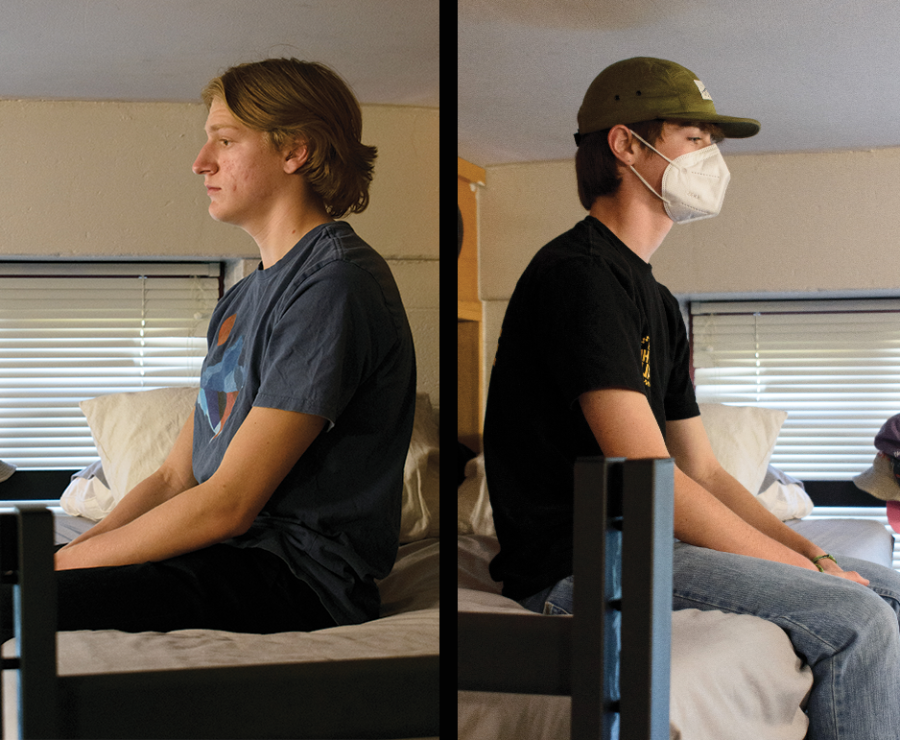“I have to avoid the room at all times now:” No COVID isolation housing poses problems for on-campus students
Photo Illustration: First-years Ethan Wolfe and Thomas Didier demonstrate the difficulty of adjusting one’s routine when a roommate tests positive for COVID-19.
UVM’s lack of isolation housing for students who test positive for COVID-19 has created logistical troubles and uneasiness for some living on campus as they navigate sharing rooms with others, several student sources say.
While Jeanne Mance Hall and Slade Hall served as isolation housing for COVID-19-positive students for the 2020-21 and 2021-22 school years, students who contract the virus this year remain in their regular dorms, according to an April 26 Cynic article.
“[The lack of isolation housing] was intentional,” Residential Life Director Charles Holmes-Hope said. “It was purposeful with the idea of really supporting our students, and I think that we gave students, I believe, tools and resources prior to coming to UVM about how to manage [the new protocols].”
This change aims to direct students back to identifying with their campus space and community, Holmes-Hope said.
“Over the summer, we strategically planned opening with campus partners to really talk through what does it mean to be in a ‘post-pandemic,’” he said. “On opening day, [we provided] students with testing kits and masks so that they were prepared.”
ResLife concluded that having students quarantine in their rooms was the best course of action, Holmes-Hope said. The decision to eliminate designated isolation housing was in line with up-to-date public health guidance—not a result of UVM following their pattern of admitting their largest class to date for several years on end.
“Our thinking was informed based on data,” Holmes-Hope said. “We looked at data from last year [about the number of COVID-19 cases] to inform our practices moving forward.”
UVM isn’t seeing the uptick in cases at this point in the year that it had at the beginning of the semester because ResLife provided education and outreach to students about infection prevention, he said.
This outreach consisted of three virtual sessions conducted prior to the first day of classes that introduced students to new COVID-19 procedures, Holmes-Hope said. The sessions promoted various psychological coping strategies as well as advice to buy fans and open windows to promote circulation.
UVM advises COVID-19-positive students to isolate in their dorms, leave the room only when completely necessary and to stay away from their roommates, according to the University’s information page about COVID-19.
As for roommates of the COVID-19-positive student, they must practice what is known as “proximity housing:” the roommates must wear masks for 10 days after exposure whenever around the positive student, physically distance themselves from the positive student and help them with their food and laundry, the website states.
A group of students in a forced triple on Redstone campus learned about the University’s new protocols when first-year Ethan Wolf tested positive for COVID-19 Sept. 8.
Wolf said he found out how to isolate with instructions not from UVM administration, but by researching the UVM COVID-19 information page online.
“I did a lot of research,” Wolf said. “I started on the UVM website and went through all of their resources, then I looked at other colleges’ stuff too to see how they did [isolation procedures].”
Wolf and his roommates incorporated his findings into their routines: masking up in the dorm, separating the beds and regularly testing for COVID-19, all of which are encouraged by UVM policies.
When first-year Thomas Didier, Wolf’s roommate, learned about Wolf’s positive test, he prioritized everyone’s safety, he said.
“I was just kind of thinking, ‘I have to avoid the room at all times now,’” Didier said. “I didn’t want to go [to the dorm] that much.”
In Didier’s case, avoidance of the room wasn’t just a daytime practice.
“I slept in one of my friend’s rooms the first night,” Didier said. “If [a friend had] somewhere comfortable to sleep, I would totally do that.”
The group’s third roommate, first-year Noah Mass, had spent more time with Wolf in the room prior to Wolf’s positive test than Didier had.
“I was actually in the room when he tested because I knew he wasn’t feeling well,” Mass said. “It’s kind of weird because he’s got to eat, and he’s not going to wear a mask when he’s sleeping, so it’s kind of hard. It sucks for him.”
Elsewhere on Redstone campus, another forced triple became well-acquainted with UVM’s COVID-19 protocols when first-year Cameil Nelson tested positive Sept. 1.
Nelson also didn’t find out UVM’s protocols from the administration, but from her Residential Advisor.
“Nobody really said anything,” Nelson said. “So I asked my RA what I should do—she said just to stay in [my] dorm.”
Nelson was both angry and frustrated at having to remain in her room. She felt bad that her roommates had to move into another room with friends when they had just begun to settle in, she said.
“None of us were happy about it,” Nelson said. “I think if there were a bigger space for people who had COVID to move into, like another building, that would have been helpful.”
Nelson’s roommates, first-years Noa Pinkston and Madeline von Freymann, took matters into their own hands.
“We left the room for a week and we went into our other friends’ dorms,” Pinkston said. “We had to make that decision on our own. We did not have any guidance or any help from the administration on what to do.”
Pinkston said she felt very overwhelmed during this period because the routine she was just starting to settle into was disrupted by keeping Nelson in their dorm.
“I was sleeping on someone’s floor for five days,” Pinkston said. “It was not an ideal situation.”
Von Freymann also took this avenue.
“I had friends that were offering to let me stay with them, which worked out perfectly,” she said.
However, von Freymann doesn’t think this is the best solution to avoiding proximity housing, she said.
“We’re in a triple, so it doesn’t really make a whole lot of sense that one person would stay in the room and two people would have to go out,” von Freymann said.
Her frustrations grew when she learned of previous COVID-19 housing protocols at UVM.
“I heard there were so many preventative measures and that when people did have COVID there was a designated dorm, and I feel like that’s a good solution,” von Freymann said. “I just think that they were so careful about it last year, then this year there’s really [nothing] whatsoever.”







